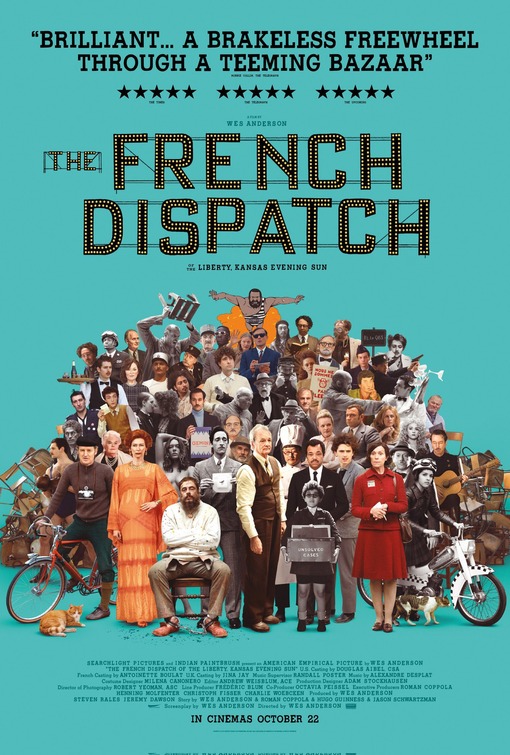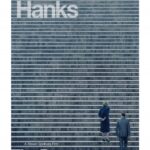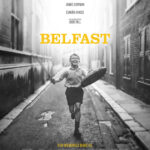Of The Liberty, Kansas Evening Sun
Director
Wes Anderson
Starring
Bill Murray
Tilda Swinton
Frances McDormand
Jeffrey Wright
Divided into four parts, more or less, The French Dispatch is the story of the final edition of a magazine of the same name. Set in a version of the 1960s in a fictional part of France, we learn about the handful of head writers working for the magazine and their selected pieces for the last publication owing to the editor’s demise. Acting as an anthology of eccentric vignettes, we are treated to the story of an incarcerated art prodigy, a student protest that leads to civil unrest, the kidnapping of a police commissaire’s son and a handful of lighter sections such as a tourist’s guide to Ennui; the magazine’s base of operations. All of which is presented as living articles, including all the various footnotes, endnotes, authorial conversation and other such intertextual discourse.
Anderson is such a distinctly esoteric director at the height of his power and influence meaning anything he works on is a graphic designer’s dream. Every shot feels like it must have taken weeks to organise for something that spends little more than a second or two on screen and everything from the sets to the locales, even the animated segments, are all very evocative of a finely cultivated non existent time and place, the farcical heightened world of strife and love which Anderson’s characters reside in. Visually the film is a wonder, jerking back and forth between b/w and colour for impact or possibly just the whim of the director, while offering magnificently symmetrical arrangements and various still life tableaux. Alexandre Desplat once again returns and gives us a typically beautiful score, which has all the jaunty playfulness one would expect with a soupçon of Erik Satie melancholy.
On the surface, these are tales of artists: painters, essayists, illustrators, editors, political theorists, writers, critics – not to mention the correspondents themselves. Each field is brought to life with the wonted quirky performances in an Anderson release. The trouble is, among the usual jumble of famous names and idiosyncratic faces the cast becomes so vast and competent that no one truly stands out. Individuals who could, and often do, command their own feature films, shine in their 2 minutes of screen-time as much as the fairly unknown up-and-comers; all are equally peculiar and are assimilated into Anderson’s esoteric style to the degree that to list who they are or what they do in the film feels like a moot point. Naturally, a handful are afforded more screen-time but when every performance, every shot, every sequence is a charming oddity, then nothing is truly extraordinary bar the whole. But this is the issue because the whole is somewhat lost.
The French Dispatch is undeniably singular in its richness but it’s largely without direction. Obviously I don’t mean the overseeing hand of the director himself – his presence is felt in ever minutiae – I mean the flow of it all. Regrettably, this movie is strikingly rudderless. Brilliant in its execution but lacking in its necessity. Now, many will argue that’s par for the course but that doesn’t excuse a stodgy collection of tales that make a crisp 1hour 40minute runtime feel an extra hour longer. In truth, Anderson doesn’t make bad movies but this is one of his lesser efforts.
Release Date:
22 October 2021
The Scene To Look Out For:
One of The French Dispatch’s writers is being interviewed on television and in the process recounts the events that led to one of his most famous articles. Midway through the interviewer interrupts the recollective flow to ask why he so often writes about food, no matter what subject he is covering. The journalist in question, Roebuck Wright [Wright] begins talking about his love of writing about, consuming and enjoying the art of food. The camera pans away from the colourful 1970s TV studio set before snapping to the same set in black and white with a slightly younger version of Wright in 60s attire. This is a primary example of where the film kept losing me. We feel like we’re just about to get going into something interesting – specifically a prolonged period of something interesting – before the film pivots back just as quickly and the moment is stripped away to be surprisingly little, while the film capriciously moves on to the next little fleeting idée fixe.
Notable Characters:
As stated, this film is rife with glorious talent. The more I ponder on the film, the more I remember certain momentary details and moreover, certain individuals but partly for how little they had to do but how well they did it. It’s just a shame that this film feels so uneven that there isn’t more of a central narrative pulling everything and everyone through. I appreciate that’s sort of supposed to be Bill Murray’s character (the Dispatch’s editor, Arthur Howitzer Jr) but his presence in each of the vignettes doesn’t have the impact one would hope to convey how and why this diverse range of journalists have nailed their disparate colours to this particular mast.
Highlighted Quote:
“I’m not brave, I was just in the mood not to be a disappointment to everybody”
In A Few Words:
“The film, as a whole, is altogether fine. Which, when considering Anderson’s body of work, is altogether damning”
Total Score: 3/5

![The Red Right Hand Movie Reviews [Matthew Stogdon]](https://reviews.theredrighthand.co.uk/wp-content/uploads/2021/12/cropped-header1.png)



